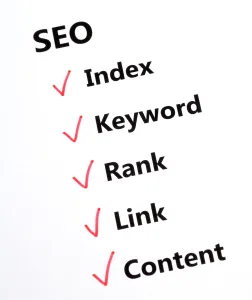Is AI-generated content the answer to SEO success? It is an intriguing concept; leveraging artificial intelligence to streamline and produce quality material for your website. But what are the implications of using it in terms of search engine optimization (SEO)? Will Google penalize content generated by machines or subtly ignore it?
In this blog post, we’ll explore AI-generated content and its impact on SEO ranking and penalties. We’ll consider key questions such as “Is AI-generated content good for SEO?”, “Will Google penalize AI content?” and “How can one best utilize AI tools to generate quality content?” Additionally, we’ll discuss techniques used to detect when a machine has written the material, and evaluate the top AI content generators currently on the market. With this information, organizations will have a clearer view of how best to leverage intelligent technology as part of their SEO strategy.
Is AI-generated Content Good for SEO?
 AI-Generated Content is a type of written content that has been created using Artificial Intelligence. This technology uses Natural Language Processing to automatically generate content from a pre-defined data set, including text, images, and video. It can be used for a variety of tasks such as creating website copy, blog posts, press releases, and even entire books.
AI-Generated Content is a type of written content that has been created using Artificial Intelligence. This technology uses Natural Language Processing to automatically generate content from a pre-defined data set, including text, images, and video. It can be used for a variety of tasks such as creating website copy, blog posts, press releases, and even entire books.
One major benefit of using AI-Generated Content for SEO purposes is the potential cost and time savings. Creating content manually requires intensive labour hours which can take hours or even days to produce. With AI-generated content, however, an SEO team can create vast amounts of material in a very short space of time.
While there are numerous benefits to using AI content tools for SEO campaigns, it’s important to consider some potential drawbacks. In some cases, the quality or accuracy of the content may suffer because it cannot always account for human context and intent when generating copy. Additionally, SEO teams must be careful not to fall into the trap of producing content in bulk and publishing it all without checking it first.
Despite these concerns, AI-Generated Content is proving to be an effective tool for SEO professionals looking to boost their campaigns quickly and efficiently while ensuring maximum accuracy. By leveraging this useful tool alongside traditional marketing practices like link building and PPC strategies, your team can craft compelling search engine strategies that drive lasting organic growth over time.
Will Google Penalize AI Content?

The use of Artificial Intelligence to help create content has become increasingly popular with SEO professionals. But the question remains, will Google penalize content that is AI-generated rather than human authored?
Google’s focus on rewarding high quality content means they are constantly striving to improve their search results by filtering out low quality or spammy websites. Their rank systems incentivise original, reliable content and take into account factors like E-E-A-T to determine authority, trustworthiness and expertise in a certain field. Google have clearly stated in their most recent AI search guidance that as long as content meets these factors, it is eligible for ranking, regardless of how it was created.
The update posted today on Google Search Central makes clear Google’s belief that AI does have its place in creating relevant and helpful content for users. Any penalties for spam content will only be applied to content focused on manipulating their search algorithms, whether it was created by AI or by humans. To ensure this is kept in check, last year saw the introduction of a “helpful content” system which evaluates websites that feature higher quality and more pertinent information over those designed solely for SEO gains.
To summarise, while it is true that Google frowns upon low quality or spammy content displayed in their search rankings, they do not consider all AI-generated content to be low quality or spam. In fact, done properly, AI can be a valuable asset for producing comprehensive relevant pieces that serve real user needs as well as achieving high search rankings. Therefore, when considering using AI as part of your SEO best practices, keep these guidelines from Google in mind and ensure you’re developing helpful content for people, not just for search engines.
Can I use AI-generated content to rank on Google?
 The short answer is yes, but it must be done wisely. For content that has the primary purpose of manipulating rankings in search results, this would violate Google’s spam policies and should be avoided.
The short answer is yes, but it must be done wisely. For content that has the primary purpose of manipulating rankings in search results, this would violate Google’s spam policies and should be avoided.
However, when done correctly, AI-generated content can foster optimization when used in accordance with Google’s guidelines. In order to produce a people-first approach and adhere to these guidelines, it is important to consider the audience who will consume this content. Does the content address a need or provide value to your readers? Does it display clear expertise and knowledge about a certain topic? Furthermore, does your content have a primary focus or intended outcome for those reading?
AI-powered technologies can provide great potential for creating helpful and engaging web content. These new tools offer ways of expressing creativity whilst simultaneously providing tangible benefits such as helping writers improve their scalability, speed up processes and reduce costs. As always, approaches that put people first should prioritize usability and readability in order for audiences to receive an educational or enjoyable experience from the material produced by AI-generated technology.
In order to achieve successful ranking on Google through utilizing AI-generated content, there are a few key things you should strive for. Including generating quality topic clusters with well-researched keywords and phrases related to the subject; optimizing page titles by incorporating high volume keywords; ensuring all pages include detailed meta descriptions; structuring internal links effectively and providing informative headings throughout text copy where appropriate.
By executing semantic intelligence through efficient neural networks you can craft relevant material that will hopefully satisfy user search intents whilst improving both visibility of your website on search engine result pages and relevance within featured snippet spaces. When used in moderation – also considering other improved site practices – incorporating data collected by machine learning techniques can be beneficial for SERPs optimization purposes; although you should not forget that ultimately human beings remain at the centre of this process, so make sure your material resonates with them too!
Can Google Detect AI-Generated Content?
 Google is an industry leader in the use of Artificial Intelligence technology. However, it can be extremely difficult to detect when text is created by AI models like ChatGPT. This is because these language models aim to generate fluent and human-like text, making it hard to differentiate from original human writing.
Google is an industry leader in the use of Artificial Intelligence technology. However, it can be extremely difficult to detect when text is created by AI models like ChatGPT. This is because these language models aim to generate fluent and human-like text, making it hard to differentiate from original human writing.
To help detect AI-created content, OpenAI has developed its own detector by training a new model with both AI and human-generated text samples. Unfortunately, this detector is very unreliable with some finding that accurate detection of AI written texts is sometimes as low as 26%.
Watermarking also provides a unique way for detecting AI-generated text – this involves adding “secret signals” inside a piece of content which allows computer programs to identify it as artificial. The University of Maryland has developed watermarking techniques, but this requires companies such as OpenAI embedding them into their chatbots from the start.
These methods depend on companies investing time in implementing watermarks in order to accurately detect texts created with Artificial Intelligence tools. Without these steps being taken, Google may struggle to tell with accuracy if content has been generated by an AI model or not. So far, no commercial AI writing models have implemented an AI watermarking facility.
Although these methods are available and successful at detecting AI-made content, they are far from perfect and rely on both the willingness of AI model creators to implement them and Google’s ability to analyse the data without fail.
What is the Best AI Content Writing Tool?
 With so many options available, it’s impossible to choose the best AI content writing tool on the market. Whilst most of the tools are built on the exact same OpenAI GPT 3 model, there are tools which specialise in different kinds of content generation. It’s also important to note that the output quality will also vary depending on the quality of the prompt engineers behind the tools.
With so many options available, it’s impossible to choose the best AI content writing tool on the market. Whilst most of the tools are built on the exact same OpenAI GPT 3 model, there are tools which specialise in different kinds of content generation. It’s also important to note that the output quality will also vary depending on the quality of the prompt engineers behind the tools.
I’ve listed five of the tools I use for AI-generated content; every single one of the tools listed has been used at least once to generate content for this site.
Frase offers a really impressive AI content generator that takes top-ranking search results and analyses them to help you with your SEO optimization. This tool produces well-written content that sounds human, and the ability to use templates created by top AI prompt engineers makes it an ideal choice. You can get a discount on your first month using this link. If you’re unsure whether this tool is for you, read my review of Frase AI.
Nichesss is possibly the best value AI writing tool, offering over 150 features for an affordable one-off price. It also has some unique features with a content generation API and a Nichesss website widget that you can add to your own website. You can get Nichesss here for a one-off price of $59. If you want to test it out first, you can use the website widget embedded at the bottom of this post.
Katteb fact checked AI Writer is a great choice for those who need high-quality, accurate content in a rush. Using natural language processing techniques and real data from trusted sources, it can provide users with fact-checked content in no time at all. You can pick up a Katteb monthly subscription at this link.
Riku is unique among other AI tools due to its no-code capabilities, which allow you to build custom AI content generators using prompt engineering. Additionally, it gives the user a great prompt building experience and access to a wide range of community prompts that you can use or learn from. Riku connects to different AI models, including GPT-3, using your own APIs and gives you free access to open sourced models. You can get a free trial of Riku here, or you can learn how to create a prompt with Riku in this blog post.
ChatGPT stands out from traditional content writing tools through its ability to process information within the context of a given query through natural language processing techniques. With this feature it is easier to guide the AI towards giving you the exact content you are looking for. It is also created by the company that created GPT-3. You can sign up to use the free version of ChatGPT here and can join the waitlist for access to the Plus version.
Conclusion
AI-generated content has many potential benefits to SEO, such as creating more relevant, keyword-rich content that is optimized for search engines and users alike. Not only can it save time in manual content creation processes, but AI also allows for improved accuracy when creating content for a specific audience or purpose. Furthermore, Google does not penalize sites if their content is generated by AI tools – making it all the more attractive to content marketers and SEO professionals.
While AI can be used to create content quickly and effectively, it is important to keep in mind that the ultimate goal should always be having quality content offering value to the user. Google wants people to feel satisfied with the result of any search query – so any content needs to be designed with people, not search engines in mind. As an SEO expert or marketer, understanding how to utilize AI-generated content effectively is going to be the key to success in the future.
